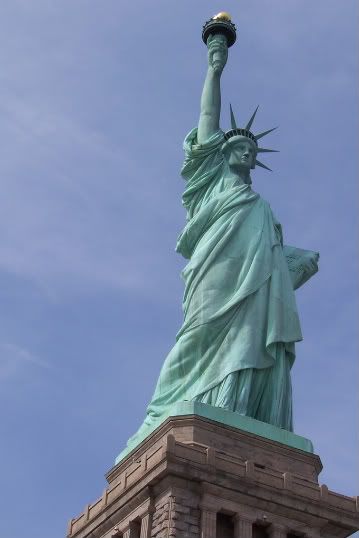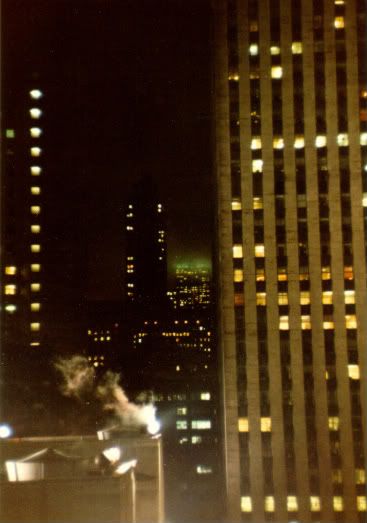Thursday, October 28, 2004
Context: As the Pieces Begin to Fit Together...
... We see an interlocking story unfold, not isolated scraps of unwieldy information.0 comments
Due to the short attention span of cable news cycles, this tidbit seems like eons ago, however:
AP: White House Silent on Bremer Troop Request
Remember that puzzle piece?
In remarks published Tuesday (Oct. 4, 2004), the official, L. Paul Bremer, said he arrived in Iraq on May 6, 2003 to find "horrid" looting and a very unstable situation—throwing new fuel onto the presidential campaign issue of whether the United States had sufficiently planned for the post-war situation in Iraq.
"We paid a big price for not stopping it because it established an atmosphere of lawlessness," Bremer said during an address to an insurance group in White Sulphur Springs, W.Va. The group released a summary of his remarks in Washington.
"We never had enough troops on the ground," Bremer said
Pair that with...
In an earlier speech Sept. 17 at DePauw University, Bremer said he frequently raised the issue of too few troops within the Bush administration and "should have been even more insistent" when his advice was rejected.
"The single most important change—the one thing that would have improved the situation—would have been having more troops in Iraq at the beginning and throughout" the occupation, Bremer said, according to the Banner-Graphic in Greencastle, Ind.
That all fits in snugly with this week's weapons madness...
Timeline on Missing Explosives in Iraq
By The Associated Press
October 27, 2004, 5:16 PM EDT
* 1991: The International Atomic Energy Agency places a seal over storage bunkers holding conventional explosives known as HMX and RDX and PETN at the Al-Qaqaa facility south of Baghdad as part of U.N. sanctions that ordered the dismantlement of Iraq's nuclear program after the Gulf War. HMX is a "dual use" substance powerful enough to ignite the fissile material in an atomic bomb and set off a nuclear chain reaction.
2003
* January: IAEA inspectors view the explosives at Al-Qaqaa for the last time. The inspectors take an inventory and again place storage bunkers at Al-Qaqaa under agency seal.
* February: IAEA chief Mohamed ElBaradei tells the United Nations that Iraq has declared that "HMX previously under IAEA seal had been transferred for use in the production of industrial explosives." This apparently didn't include the HMX that remained under seal at Al-Qaqaa.
* March 9-15: Nuclear agency inspectors visit Al-Qaqaa for the last time but apparently don't examine the explosives because the seals aren't broken. The inspectors then pull out of the country.
* March 20: The U.S.-led coalition invades Iraq.
* April 3: The Army's 3rd Infantry Division reaches Al-Qaqaa, fights with Iraqi forces, occupies the site and leaves after two days for Baghdad without searching for high explosives.
* April 9: The 3rd Infantry Division captures Baghdad.
* April 10: Troops from the 101st Airborne Division's 2nd Brigade spend 24 hours at the site, search for chemical weapons—but not high explosives—and then head to Baghdad. An NBC reporter embedded with the unit said there's no talk among the 101st of securing the area after they leave.
* May 3: The nuclear agency purportedly notifies the U.S. Mission in Vienna of its concerns about the Al-Qaqaa facility.
["L. Paul Bremer, said he arrived in Iraq on May 6, 2003 to find "horrid" looting and a very unstable situation"—ed.]
* May 8: An American site survey team arrives to inspect the Latifiyah Phosgene Facility—part of Al-Qaqaa—and finds the plant heavily looted.
* May 11: An American site survey team arrives to inspect Latifiyah Missile and Rocket production facility, also part of Al-Qaqaa. The team assesses the facility as non-operational but with possible dual use.
* May 27: U.S. troops search specifically for high explosives. The troops find the seals have been broken. It's not clear whether they did a further accounting of the materials themselves.
2004
* Oct. 10: Iraq's Ministry of Science and Technology tells the nuclear agency that 377 tons of explosives has disappeared from the Al-Qaqaa facility. The Iraqis say the materials were stolen after the April 9, 2003, fall of Baghdad because of a lack of security.
* Oct. 15: The IAEA informs the U.S. mission in Vienna about the disappearance. National security adviser Condoleezza Rice is informed days later, and she informs President Bush, according to White House press secretary Scott McClellan.
* Oct. 23-24: The Pentagon orders the U.S. military command in Baghdad to investigate the IAEA report.
* Oct. 25: ElBaradei reports the explosives' disappearance to the U.N. Security Council after The New York Times reports the cache is missing.
Copyright © 2004, The Associated Press
Now, a simple parlor-game approach to this enterprise would entail drawing up war plans that listed all conceivable military targets (including all oil fields, bunkers and ammo dumps, figuring out how many troops it would take to secure all of them in one sweep, then assigning different targets to different battalions.
That's pretty much how it's always been done, right? From cudgels through longbows and muskets and howitzers, right up through Bradleys, right?
But instead of consulting long-time Risk players or multi-piece puzzle players, they decided to go play Rock, Paper, Scissors with their plan.
So, the only questions really are:
Who was assigned to Al-QaQaa?
No one?
Then, who is the individual who left Al-QaQaa off the list?
And who are all the individuals up the chain of command, all the way to the "Commander-In-Chief," who signed off on that plan without it being thoroughly double-checked?
What punishment has been meted out to those responsible for the lives lost due to this blunder?
Where is that HMX now?
How much time, exactly, has been spent by U.S. forces over the last 18 months, looking for these explosives which have been killing and maiming their comrades and thousands of Iraqi civilians on a daily basis?
And why did Bush / Cheney / Rice / Rumsfeld / Wolfowitz / Feith allow this to happen?
There's a simple answer. And anyone who's ever put a puzzle together can figure out that "why."
posted by Gotham 1:42 PM
0 Comments:

